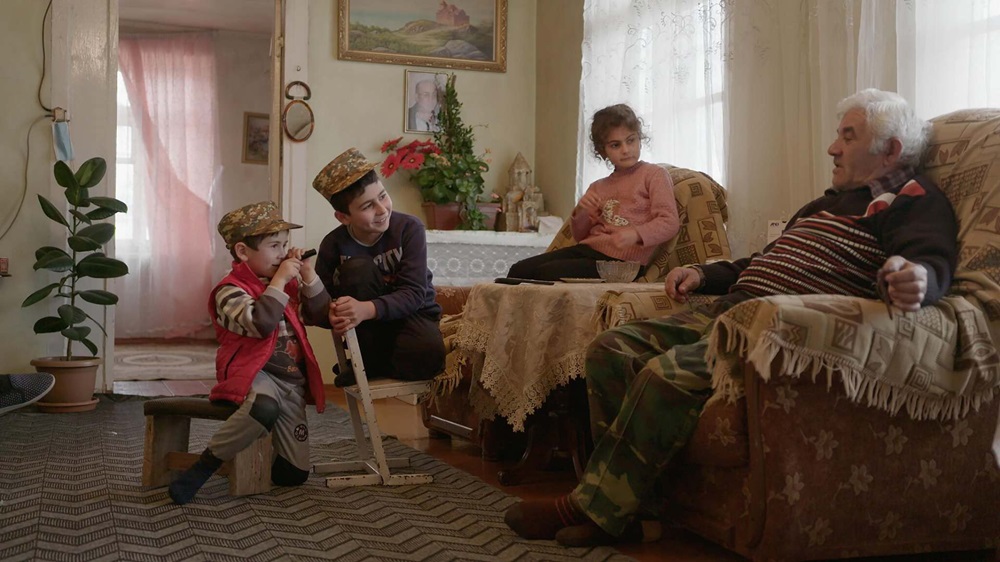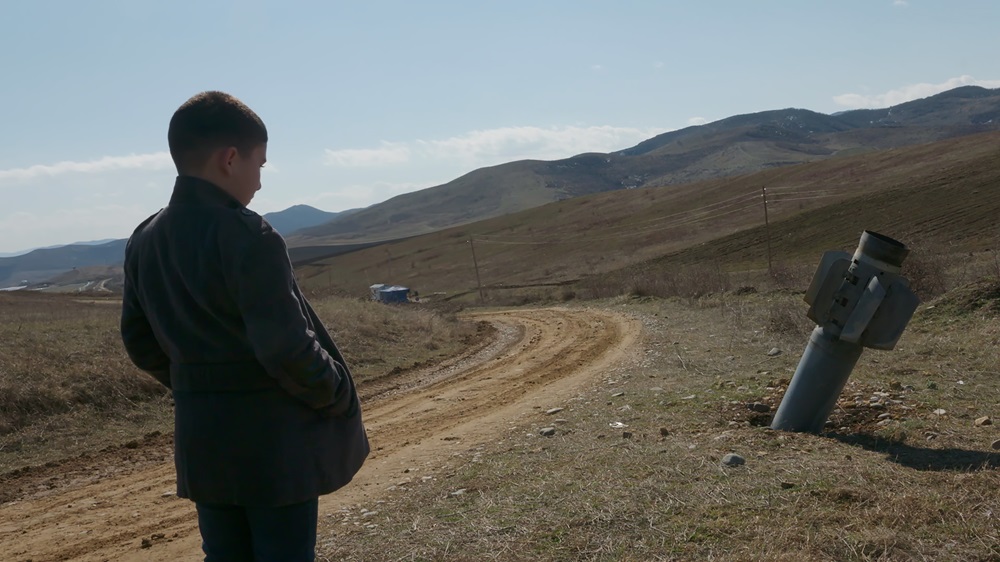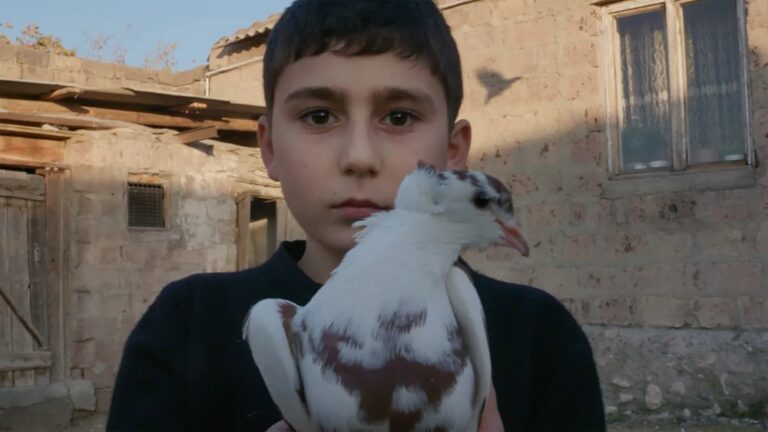At its heart, “My Sweet Land” explores the fragility of life in Artsakh. Through the eyes of Vrej, an 11-year-old boy with a radiant intellect and an unwavering dream of becoming a dentist, we witness his journey through war and turmoil. More importantly, Hairabedian succeeds in juxtaposing the loss of innocence with a traumatized society, amplifying the call for children to live in peace, not as prisoners of inherited wars.

Childhood in the Shadow of Conflict
“My Sweet Land” opens with a striking amateur video from 2008. In it, hundreds of couples gather for a mass wedding in Artsakh, a celebration the officiating minister reminded the audience that was possible only because of those who fought to reclaim their homeland. A decade later, the film shifts to Vrej’s village, Martakert, where life unfolds against the tension of an uncertain future.
The film’s cinematography (which Hairabedian also handled) captures the idyllic beauty of the landscape—the rolling hills, golden vineyards, and bustling markets—creating a striking contrast to the realities faced by its people. “We live in a country where war is expected to start at any minute,” Vrej explains. His words reflect a wisdom far beyond his years, shaped by a world where landmines litter the fields, and military training begins in childhood.
When an Azerbaijani offensive forces Vrej’s family to flee their home, the pain of displacement is palpable. Upon their return, they find their house intact but their land diminished, a stark reminder that home in Artsakh is never secure. Despite the hardships, life continues. Children laugh and play in the streets, families gather for tea, and moments of fleeting joy pierce through the tension.
Related Review: ‘1489’: A Timely, Harrowing Reminder of the Human Cost of War
A Filmmaker’s Intimate Connection
Hairabedian’s personal connection to the story gives the film a quiet but profound depth. As a descendant of Armenian genocide survivors, she carries the legacy of displacement and inherited trauma. This history brought her to Artsakh in 2018, where she sought to document the lives of its people. Meeting Vrej gave her focus. His story, at once deeply personal and universally relatable, became the centerpiece of her film.
The bond between director and subject is evident throughout. Vrej speaks openly to Hairabedian, even addressing her directly at times. In one heartbreaking moment, he asks if his story will end like that of a tragic hero. His words cut to the core of the film’s themes: the inevitability of conflict and the stolen innocence of childhood in war zones.
Hairabedian’s observational style allows the story to unfold organically. She captures moments of resilience—such as Vrej’s grandmother reflecting on decades of conflict—with the same care as scenes of children being taught military drills in school. How the director contrasts these moments underscores the uneasy balance between survival and despair.

The Fragility of Identity and Home
Essentially, “My Sweet Land” examines the fragility of identity and the lengths to which people will go to preserve it. Hairabedian explores how the trauma of war shapes not just individuals but entire generations. Children like Vrej grow up with dreams that stand in stark contrast to the dark futures awaiting them.
The film also highlights the indifference of the international community toward Artsakh’s plight. In 2023, Azerbaijan annexed the region after a prolonged blockade, forcing tens of thousands of Armenians to flee. While Hairabedian avoids overt political commentary, the urgency of her message is clear: the erasure of a homeland isn’t just a geopolitical tragedy—it’s a human one.
In its retelling of an urgent story, the filmmakers’ decision to focus on Vrej allows them to convey the conflict’s emotional weight in a way broader political narratives often cannot. And yes, some viewers might critique the lack of a wider lens or wish for more direct historical context. However, this narrow focus is also the film’s strength. By zeroing in on one boy’s life, Hairabedian makes the global become personal.
Her cinematography complements this intimacy. The beauty of Artsakh’s landscapes is ever-present, even as war encroaches. It serves as a poignant reminder of what is at stake: not just land, but a culture, a history, and the hopes of a people who refuse to disappear.
Related DOC NYC Review: With Arresting Vulnerability, ‘The Three of Us’ Explores the Delicate Balance Between Family and Faith
‘My Sweet Land’: A Story That Demands to Be Seen
“My Sweet Land” is more than a film about survival; it’s also a testament to the enduring human will. Hairabedian gives voice to a persecuted people and a land on the brink of erasure. Vrej’s story resonates far beyond Artsakh, echoing the experiences of countless children caught in conflict zones worldwide.
The film’s strength lies in its quiet power, its ability to convey enormous truths through small, everyday moments. While it may not answer every question or provide a comprehensive history, it doesn’t need to. Its purpose is to bear witness and ensure that Artsakh’s story is not forgotten. Through the eyes of one boy, “My Sweet Land” captures the weight of inherited wars and the fragile hope for a future beyond them. It’s a haunting, beautiful film that lingers long after the final frame.

While “My Sweet Land” was initially selected as Jordan’s entry for Best International Feature Film at the 97th Academy Awards, the country later withdrew its submission due to diplomatic pressures from Azerbaijan. The film had its North American premiere in the U.S. competition at this year’s DOC NYC. The festival runs from November 13 to December 1, 2024. Follow us for more coverage.


